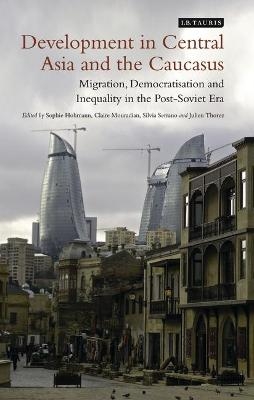
Development in Central Asia and the Caucasus
I.B. Tauris (Verlag)
978-1-78076-579-2 (ISBN)
Development in Central Asia and the Caucasus draws together detailed analyses of the development of migration economics as the region's oil wealth further enhances its strategic and economic importance to Russia, the US, the Middle East and to the EU.
Sophie Hohmann holds a PhD in social sciences and demography from the EHESS (School of Advanced Studies in Social Sciences) in Paris. Claire Mouradian is senior research fellow at the CNRS (National Centre for Scientific Research) and coordinates Caucasian studies at the CERCEC (Centre for Russian, Caucasian and East-European studies). Silvia Serrano teaches political science at the Law faculty of the Universite d'Auvergne in Clermont-Ferrand and is a research fellow at the CERCEC. Julien Thorez is a research fellow of the CNRS in Paris and member of the unit 'Iranian and Indian Worlds' composed of researchers from the CNRS, EPHE (Practical School of Advanced Studies), Sorbonne Nouvelle and INALCO (National Institute for Oriental Languages and Civilisations).
Introduction The Post-Soviet Caucasus and Central Asia: Another South?10
Part 1 Post-Soviet Region or Post-Colonial Countries?19
The Origins of a Colonial Vision of Southern Russia from the Tsars to the Soviets: Selected Imperial Practices in the Caucasus20
‘Trust in Cadres’ and the Party-Based Control in Central Asia During the Brezhnev Era41
Nations and Postcolonialism in Central Asia: Twenty Years Later64
Functional Clusters and Diverging Paths in Post-Soviet South: The Georgian Case77
Part 2 Development, Inequalities and Poverty93
Systemic change in two Central Asian rentier states: Turkmenistan and Kazakhstan94
Human Capital and Inequality in Tajikistan: Intercommunication and Interdependence114
Measures of Poverty in the Caucasus and Central Asia: International Approaches and Specificities of Southern Countries of the Former Soviet Union137
Part 3 The Growth of Labour Migrations. Toward a New North-South Relation?158
The Post-Soviet Space From North to South: Discontinuities, Disparities and Migrations159
Female Migration into Russia from Central Asian Countries: Migrants Researching Migrants180
Labour Migrations in the Omsk Region: Administrative and Economic Workforce Management Practices and Construction of New Social Relations196
Part 4 New Global Dynamics: States and international organizations Strategies213
The State and the Diaspora Bureaucratic and Discursive Practices in the Construction of a Transnational Community214
Turkey’s presence in Central Asia: Political and cultural tools of the Turkish presence in Central Asia or the ambiguities of a nationalist modernisation model242
Paradox of the ‘Good Governance Agenda’: Geopolitical Externalities and Development Practice in Tajikistan263
| Erscheint lt. Verlag | 25.6.2014 |
|---|---|
| Zusatzinfo | 6 bw integrated, 10 figures, 8 maps |
| Sprache | englisch |
| Maße | 138 x 216 mm |
| Gewicht | 626 g |
| Themenwelt | Sozialwissenschaften ► Soziologie ► Spezielle Soziologien |
| ISBN-10 | 1-78076-579-7 / 1780765797 |
| ISBN-13 | 978-1-78076-579-2 / 9781780765792 |
| Zustand | Neuware |
| Haben Sie eine Frage zum Produkt? |
aus dem Bereich


